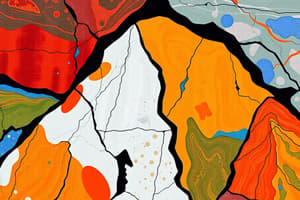Podcast
Questions and Answers
What is the primary function of ecosystems?
What is the primary function of ecosystems?
- Provide a habitat for animals only
- Produce rubber and lumber
- Produce oxygen through photosynthesis (correct)
- Convert carbon dioxide into oxygen
Which of the following is NOT a part of an ecosystem?
Which of the following is NOT a part of an ecosystem?
- Plants
- Metals (correct)
- Rocks
- Water
What is one of the main topics that 5th-grade students learn about in relation to ecosystems?
What is one of the main topics that 5th-grade students learn about in relation to ecosystems?
- Effects of weather on ecosystems
- History of ancient civilizations
- Space exploration
- Energy flow through ecosystems (correct)
Which step in the scientific method involves making an educated guess?
Which step in the scientific method involves making an educated guess?
Why is carbon dioxide important for the survival of plants and animals?
Why is carbon dioxide important for the survival of plants and animals?
Which element helps students understand the balance and interdependence within ecosystems?
Which element helps students understand the balance and interdependence within ecosystems?
What is the purpose of drawing conclusions in the scientific method?
What is the purpose of drawing conclusions in the scientific method?
How does understanding ecosystems benefit 5th-grade students?
How does understanding ecosystems benefit 5th-grade students?
Why is the scientific method important in 5th-grade science education?
Why is the scientific method important in 5th-grade science education?
What is a key aspect of the scientific method that helps students develop critical thinking?
What is a key aspect of the scientific method that helps students develop critical thinking?
In 5th-grade science, what is an essential skill students learn through the scientific method?
In 5th-grade science, what is an essential skill students learn through the scientific method?
Study Notes
5th Grade Science: Understanding Ecosystems and the Scientific Method
Ecosystems
Ecosystems are communities of interacting organisms and their environment. They include animals, plants, and non-living things like rocks, water, and air. Ecosystems come in various types, from a small puddle to vast expanses like rainforests. Rainforests, although covering only 6% of the Earth's surface, produce about 40% of the planet's oxygen through photosynthesis. Each ecosystem provides unique services, such as producing food, medicine, and materials like rubber and lumber.
Students in 5th grade learn about energy flow through an ecosystem, the effects of changes in an ecosystem, and the importance of carbon dioxide to the survival of plants and animals. They observe how organisms live and survive in their ecosystem by interacting with the living and non-living elements. This knowledge helps them understand the balance and interdependence within ecosystems.
Scientific Method
The scientific method is a way of asking and answering questions through careful observation and experimentation. It involves several steps:
- Ask a question: Identify something you want to learn about.
- Do background research: Gather information about the topic.
- Construct a hypothesis: Make an educated guess about what you think is true.
- Test your hypothesis: Design an experiment to test your guess.
- Analyze data: Look at the results of your experiment.
- Draw conclusions: Determine whether your hypothesis was correct based on the data.
- Report your results: Share your findings with others.
In the context of 5th grade science, students might use the scientific method to test a hypothesis about how plants get energy or how organisms interact in an ecosystem. This process encourages critical thinking and helps students develop a deeper understanding of scientific concepts.
Conclusion
Understanding ecosystems and the scientific method is a crucial part of 5th grade science education. Students learn about different types of ecosystems and the interdependence within them, as well as how to ask questions, design experiments, and analyze data using the scientific method. This knowledge lays the foundation for more advanced scientific inquiry in the future.
Studying That Suits You
Use AI to generate personalized quizzes and flashcards to suit your learning preferences.
Description
Test your knowledge on ecosystems and the scientific method with this quiz designed for 5th-grade students. Learn about different types of ecosystems, energy flow, carbon dioxide's importance, and the steps of the scientific method. Enhance your understanding of how organisms interact in ecosystems and how to conduct experiments.




